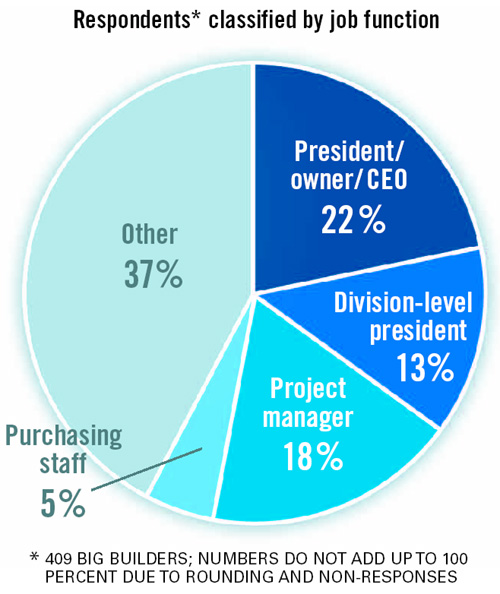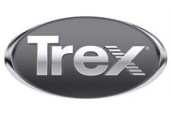Later, however, the company agreed to participate. The experience, though, didn’t sour Justus or his company on involving local dealers or distributors in its corporate purchasing agreements. In fact, he says that David Weekley would have no problem working simultaneously with building products manufacturers and a national distributor, but with one caveat: “We tell any distributor that its program has to stand on its own merits, aside from the manufacturer’s,” he says.
Broader Alliances Sought
As big builders turn their attention to finding and developing large tracts of land, they also are handing off the actual construction of homes to outside parties. At the same time, a growing number of pro dealers are making themselves more valuable to builders by adding installation to their menu of services. Many dealers employ subcontractors to do that work, and these subs wind up wielding considerable influence over what products and brands get purchased for new construction. The BIG BUILDER survey found that on average 44 percent of the building supplies purchased by the respondents are delivered by subcontractors and 50 percent of their building supply purchases are invoiced through subs (see Figure 4).
Working with subs can be a double-edged sword, however, when their product and brand preferences aren’t in sync with the purchasing agreements builders and suppliers have negotiated. All but one of the 13 home builders contacted for this article say they were curtailing subs’ buying flexibility. Melbourne, Fla.–based Mercedes Homes, for one, recently convinced a plumbing contractor, which generates 80 percent of its business from Mercedes, to convert to a sole brand to keep the builder’s business.
No doubt, builders want more control over the entire supply chain process, and to get it they are entertaining new supplier and service alliances that, hypothetically at least, could leave pro dealers on the outside looking in. Beazer Homes USA, an Atlanta-based builder that closed 15,409 homes in 19 states during the last fiscal year, which ended Sept. 30, 2003, has had preliminary discussions with two of the country’s largest plumbing and bath distributors—Ferguson Enterprises, whose parent company, Wolseley, also owns Raleigh, N.C.–based pro dealer Stock Building Supply, and Hughes Supply—about entering into a supply relationship. According to Beazer’s national purchasing director, David Singer, that partnership would likely include a private labeling component.
Additionally, on Jan.6 of this year, Pulte Homes, the nation’s second-largest home builder, announced that it had entered into a joint venture partnership with Phoenix-based Pratte Development Co. The new enterprise is called Pratte Building Systems, and will provide materials and labor for concrete foundations, flatwork, framing, and trim for all of the homes Pulte builds in Arizona and Nevada. In Phoenix, the venture also will provide material and installation services for underground plumbing. “This venture advances Pulte’s stated goals of improving its operating and financial performance through the implementation of advanced supply chain strategies,” says Richard J. Dugas Jr., president and CEO of Bloomfield Hills, Mich.–based Pulte, in a prepared statement. This deal could turn out to be a bonanza for Pratte, as Pulte expects to deliver between 8,000 and 9,000 units in those markets in 2004.
Pulte and Beazer have even broader, multi-regional agreements for the supply and installation of insulation with Masco Contractor Services (MCS), the 9-year-old division of Masco Corp., whose network now includes 54 distribution centers and 16,000 insured installers. MCS installs more than three-fifths of all the insulation that goes into new-home construction, according to the company. MCS’ president, Donnie DeMarie, surely sends shivers down the spines of many pro dealers when he speaks about providing builders with “a single point of contact” that can bring together the supply chain, construction, and back-office processes and still provide local delivery and service.
911356Many pro dealers probably aren’t too thrilled, either, with recent rumblings coming out of Atlanta, where The Home Depot executives are again talking about targeting builders as primary customers. This time there’s been action behind the talk. Depot’s HD Solutions Group now does business with 17 of the country’s 20 largest builders through its three flooring installation companies. In January, the retailer added to that stable when it acquired San Diego–based Creative Touch Interiors, whose six design centers provide flooring, countertops, and window coverings to some of the largest home builders in the Western United States. That purchase placed The Home Depot more firmly into the $25 billion home-finishing products market. Frank Blake, The Home Depot’s executive vice president of business development, told analysts and investors on Jan. 16 that 20 percent of the $120 billion that home builders spend on products annually goes toward flooring, and that The Home Depot intends to market its products and services more aggressively to builders in 2004.
Whether pro dealers, large or small, can compete in this intensified environment and can muscle their way into some of these supply chain and service deals may rest with what value builders place on these dealers’ traditional strengths: proximity, market knowledge, and personalized service. Dealers that are unable or unwilling to demonstrate their relevance to builders may never be more than bit players in this unfolding drama. And the way builders’ supply chain mechanics are meshing these days, that would be tantamount to being told, “Don’t call us, we’ll call you.” —John Caulfield is an Old Bridge, N.J.–based freelance reporter and editor who has been covering the retail home improvement field for 24 years.



